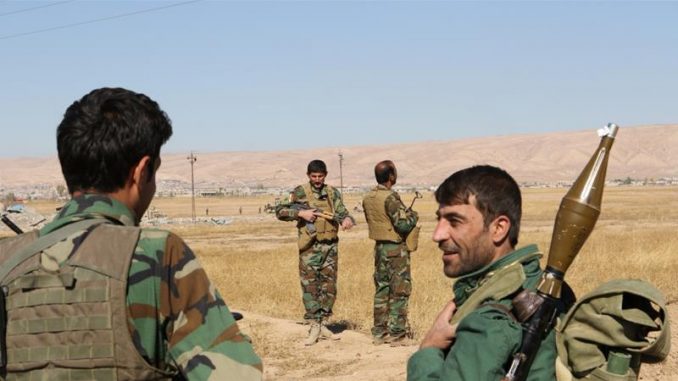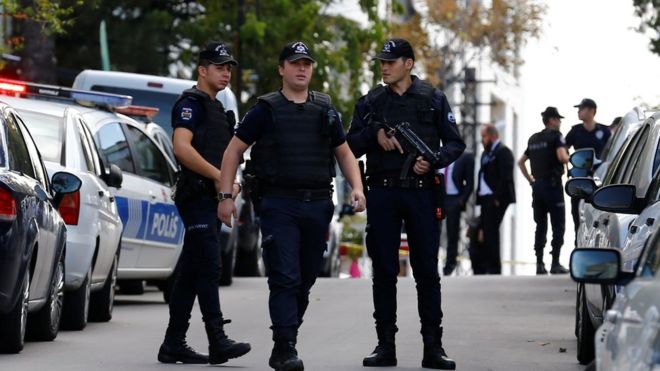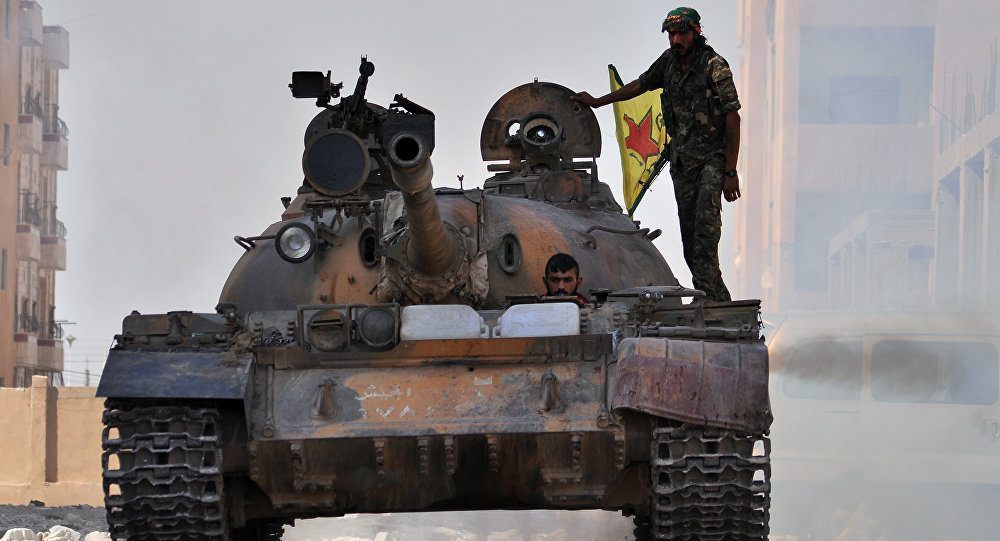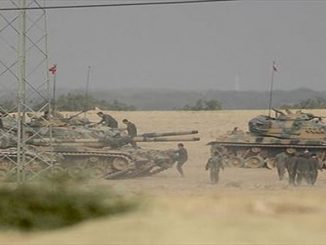
Clashes broke out between rival Kurdish groups in Iraq’s northwestern Sinjar region on Friday, two Kurdish security sources said. This incident sheds light on the fragile intra-Kurdish relations and the regional influence over the Kurdish matter.
Friday’s clashes took place in the Sinjar area near the Syrian border after forces loyal to Masoud Barzani’s Kurdistan’s Regional Government (KRG) entered an area controlled by Sinjar Resistance Units (YBS) – a Yazidi armed group alleged to be loyal to the Kurdistan Workers’ Party (PKK).
The Peshmerga Rojava is made up of Kurds from Syria and was formed and trained in Iraq with the backing of Masoud Barzani, president of the Kurdish Regional Government in northern Iraq.
The clashes started when Peshmerga Rojava forces moved towards the border with Syria, encroaching on territory controlled by YBS.
“This morning at seven clashes started with DShK [heavy machineguns]. Now there are martyrs and wounded on both sides,” a Kurdish security source told Reuters news agency.
The unrest highlights the risk of conflict and turf war between the multiple forces arrayed against Islamic State, many of which lean on regional patrons for political support and arms.
The war with Islamic State has enabled Kurds to expand their territory and influence in both Iraq and Syria, but it has also heightened competition amongst them, particularly in the Sinjar region.
The YBS group was set up there by the PKK after it came to the aid of the Yazidi population when the area was overrun by Islamic State in the summer of 2014.
The PKK’s foothold in the area has put it on a collision course with Barzani’s Kurdistan Democratic Party (KDP), which is aligned with Turkey and counts Sinjar as part of its territory.
#Shingal: First batch of pictures from #Khansor, where clashes are taking places between #PKK-affiliated YBS and Rojava-Peshmerga. pic.twitter.com/PnL18yvcZv
— Rudaw English (@RudawEnglish) March 3, 2017
#Kurdistan Peshmerga say #PKK group opened fire on them during routine deployment of their forces https://t.co/RgcVQIA4Pj pic.twitter.com/4qa4JUQYx8
— Rudaw English (@RudawEnglish) March 3, 2017
Turkey is accused
Friday morning’s clashes came after Barzani’s official visit to Turkey. YBS forces suggested that by deploying troops to the Sinjar area, the KRG was trying to force out the group affiliated with the PKK to please Ankara. The YBS accused Turkey of instigating the violence.
“These efforts [by KRG affiliated Peshmerga] that comes after Barzani’s visit to Ankara is not a coincidence. It is a provocative attempt, based on an order from Ankara,” YBS said in a statement published by the Kurdish news agency Rudaw.
The statement from the Kurdish Peshmerga warned on Friday that they do not seek authorization regarding the deployment of their forces when and where they want within Kurdistan.
The YBS vow to defend the Sinjar region and call on all Yezidis and Kurds to speak out in opposition to the attacks “with a national and united spirit.”
Barzani has close ties with Turkey and Turkish troops are currently stationed in the Bashiqa camp in northern Iraq with his invitation – and against Baghdad’s will – training local fighters who are supposed to take part in the operation to oust the Islamic State of Iraq and the Levant group from Mosul.
The PKK, on the other hand, is an armed group that has been fighting for Kurdish autonomy within Turkey since 1984. Turkey, the United States and the European Union designate the PKK as a “terrorist organisation”.
On Friday, foreign minister, Mevlut Cavusoglu on Friday said the PKK posed “a threat against the legitimate regional government in Northern Iraq and they are used by some countries against the current administration there.”
“It’s our duty to destroy these terrorist organizations wherever they are,” the minister told reporters in Ankara.
On the morning of 3 August, ISIS forces captured the city of Sinjar as well as the Sinjar area, and conducted later the Sinjar massacre, which was the killing of 5,000 Yazidi men in Sinjar city and Sinjar District in Iraq’s Nineveh Governorate.
In response, the United States reacted with airstrikes on ISIL units and convoys in northern Iraq, in addition to sending arms to the Kurdish militias there, which are Peshmerga, PKK and YPG forces, and using them as a spearhead in the region.



